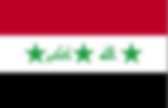

Fanar Haddad sectarianism in Iraq. The politics of Kurdish Nationalism. Iraq and the Kurds: The High-Stakes Hydrocarbons Gambit. Middle East Report N°120 19 Apr 2012 The full report is also available in Kurdish.
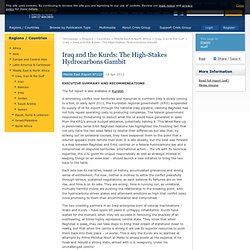
A simmering conflict over territories and resources in northern Iraq is slowly coming to a boil. In early April 2012, the Kurdistan regional government (KRG) suspended its supply of oil for export through the national Iraqi pipeline, claiming Baghdad had not fully repaid operating costs to producing companies. The federal government responded by threatening to deduct what the oil would have generated in sales from the KRG’s annual budget allocation, potentially halving it. This latest flare-up in perennially tense Erbil-Baghdad relations has highlighted the troubling fact that not only have the two sides failed to resolve their differences but also that, by striking out on unilateral courses, they have deepened them to the point that a solution appears more remote than ever. Each side has its narrative, based on history, accumulated grievances and strong sense of entitlement. Kurdistan: Still a safe haven? - Iraq. On His Uneasy One-Year Anniversary as Premier, Maliki Escalates Iraq’s Political Conflict « Iraq and Gulf Analysis.
Posted by Reidar Visser on Wednesday, 21 December 2011 13:23 Exactly one year ago, the second government of Nuri al-Maliki was approved by parliament in Baghdad.
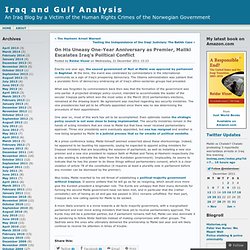
At the time, the event was celebrated by commentators in the international community as a sign of Iraq’s prospering democracy. The Obama administration was jubilant that a pluralistic form of democracy embracing all of Iraq’s ethno-sectarian groups had prevailed. What was forgotten by commentators back then was that the formation of the government was only partial. A projected strategic policy council, intended to accommodate the leader of the secular Iraqiyya party which won the most votes in the March 2010 parliamentary elections, remained at the drawing board.
One year on, most of this work has yet to be accomplished. At a press conference today, Maliki himself seemed unworried about these shortcomings. Also today, Maliki reverted to his old threat of establishing a political-majority government without Iraqiyya. Tipping Towards Iraq's Squares: An Interview with Falah Alwan. The Iraqi state releasing 335 detainees this past week?
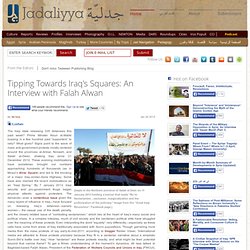
Prime Minster Nouri al-Maliki bussing in a few hundred paid “supporters” to rally? What gives? Signs point to the wave of mass anti-government protests mostly centered around the provinces al-Anbar, Niniweh, and Salah al-Deen, shaking Iraq since 21 December 2012. These evolving mobilizations have sometimes brought out numbers approaching hundreds of thousands (as in Mosul’s Ahrar Square) and led to the blocking of a major Iraq-Jordan-Syria Highway. Some have also claimed the recent mobilizations as an “Iraqi Spring.” Ali Issa (AI): What happened recently in Iraq to trigger mass mobilizations seeing as how the street has been very quiet the past several months?
Falah Alwan (FA): The protests that many Iraqi cities are witnessing now are not actually in reaction to a passing event. AI: What is the situation of prisoners in Iraq now, especially women prisoners? AI: How do the protesting forces attempt to go beyond sectarianism?
2003-2011 Iraq war. The Iraqi Civil War - 2006-2009. Iraq Ten Years On. Iraq: Reading... Iraq - curators... To sort... The Iraqi Oil industry. Bombings Roil Iraq as Sunni Arabs Re-arm. The death toll in Thursday’s bombings and attacks in Baghdad and environs rose to about 67 dead, with hundreds wounded.
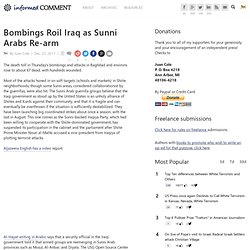
Most of the attacks honed in on soft targets (schools and markets) in Shiite neighborhoods, though some Sunni areas, considered collaborationist by the guerrillas, were also hit. The Sunni Arab guerrilla groups believe that the Iraqi government as stood up by the United States is an unholy alliance of Shiites and Kurds against their community, and that it is fragile and can eventually be overthrown if the situation is sufficiently destabilized. They have been launching big coordinated strikes about once a season, with the last in August. Iraqi Torture Scandal Touches Highest Levels of NATO. Eight US Soldiers Killed over Two Days in Iraq By Richard A.
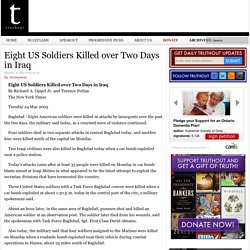
Oppel Jr. and Terence Neilan The New York Times Tuesday 24 May 2005 Baghdad - Eight American soldiers were killed in attacks by insurgents over the past the two days, the military said today, as a renewed wave of violence continued. Four soldiers died in two separate attacks in central Baghdad today, and another four were killed south of the capital on Monday.
Two Iraqi civilians were also killed in Baghdad today when a car bomb exploded near a police station. Today's attacks came after at least 33 people were killed on Monday in car bomb blasts aimed at Iraqi Shiites in what appeared to be the latest attempt to exploit the sectarian divisions that have tormented the country. Three United States soldiers with a Task Force Baghdad convoy were killed when a car bomb exploded at about 1:30 p.m. today in the central part of the city, a military spokesman said. LRB · Andrew Cockburn · Worth It. Few people now remember that for many months after the First World War ended in November 1918 the blockade of Germany, where the population was already on the edge of starvation, was maintained with full rigour.
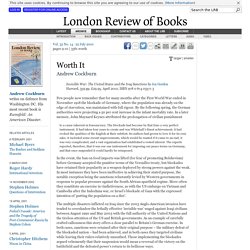
By the following spring, the German authorities were projecting a 50 per cent increase in the infant mortality rate. In a later memoir, John Maynard Keynes attributed the prolongation of civilian punishment In the event, the ban on food imports was lifted (for fear of promoting Bolshevism) before Germany accepted the punitive terms of the Versailles treaty, but blockades have retained their popularity as a weapon deployed by strong powers against the weak.